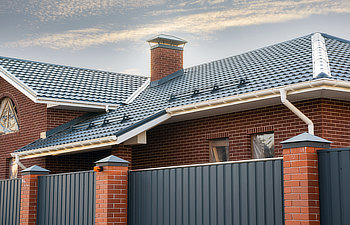
Many homeowners may overlook the importance of roofing felt when pricing a roofing job. However, this material plays a crucial role in a roof’s overall performance and longevity. Roofing contractors will know this, but as a local roofing and building supply store, you may need to explain its importance to homeowners.
Mid-Atlantic Roofing Supply delves into roofing felt, why it’s important and the benefits it offers residential roofing systems.
What is Roofing Felt?
GAF Materials LLC, one of our top residential roofing product manufacturers, says, “Roofing felt is a type of roofing underlayment, a thin water-shedding barrier that’s added between your roof shingles and the decking.”
Roofing felt, also known as tar paper, is a type of underlayment that is typically made from fiberglass or organic materials and coated with asphalt. It serves as a barrier between the roofing materials (like shingles) and the roof deck, providing an additional layer of protection against moisture and other environmental factors.
Why is Roofing Felt Important?
Here are the main reasons your home’s roof needs roofing felt underlayment:
- Water Resistance: One of the primary functions of roofing felt is to provide a waterproof barrier. This helps prevent water from seeping into the roof deck, which can lead to mold, rot and structural damage over time.
- Ice and Water Protection: In areas where ice dams are a concern, roofing felt can be crucial. It helps in managing the melting ice and prevents water backups that could potentially cause leaks.
- Protection During Installation: During the roof installation process, roofing felt provides an extra layer of defense against unexpected weather conditions, such as rain or snow. This is particularly important if the installation takes longer than expected.
- Energy Efficiency: Some types of roofing felt are designed to reflect heat away from the house, helping to improve energy efficiency. This can lead to lower heating and cooling costs over time.
- Durability and Longevity: When installed correctly, roofing felt enhances the durability of the roofing system. It provides an additional barrier against wear and tear, ultimately extending the lifespan of your roof.
- Insurance and Warranty Considerations: Many roofing manufacturers require the installation of felt underlayment to validate warranties. Not using it can complicate insurance claims in the event of damage.
Choosing the Right Roofing Felt
When selecting roofing felt, it’s important to choose a high-quality product that suits your specific roofing needs. There are two main types:
- Asphalt-Impregnated Felt: This type is more common and is available in two grades—15-pound and 30-pound. The latter is thicker and more durable, making it suitable for high-performance roofing systems.
- Synthetic Underlayment: This newer alternative is made from polyethylene or polypropylene. While generally more expensive, synthetic felt is lightweight, tear-resistant and offers superior water resistance.
Commercial and Residential Roof Felt Supplier
Roofing felt is an essential component of any residential roofing system. Its ability to provide protection against moisture, weather conditions and other damaging factors makes it a necessary investment for homeowners who want to ensure the longevity and effectiveness of their roofs.
Mid-Atlantic Roofing Supply sources only the finest roofing felt products from leading manufacturers for our partner stores. Contact us today to learn more about wholesale pricing, our delivery guarantee and more.
Posted on behalf of